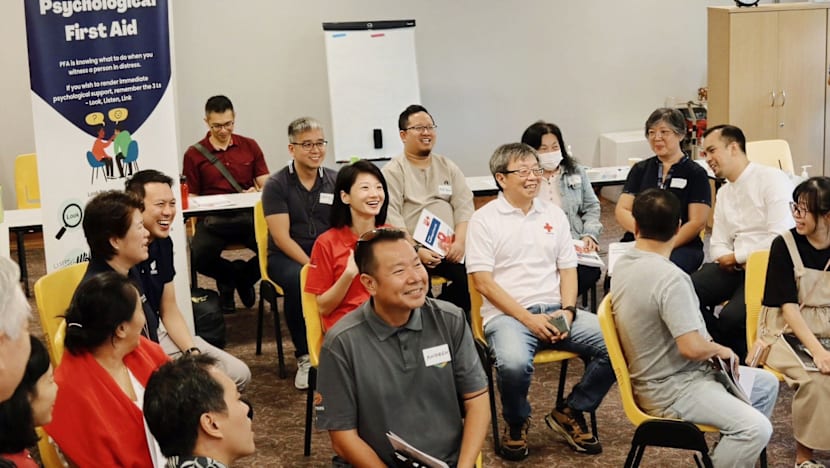Health
Singapore Advances Psychological First Aid Training for 1,500 Responders

Singapore is on track to train 1,500 SGSecure Responders in psychological first aid by the end of the current financial year. This initiative is part of a broader national effort to enhance mental resilience within communities. As of now, approximately 1,300 responders have successfully completed the training program, which was launched by the Ministry of Home Affairs in 2023.
Participants in the course learn essential skills, including how to provide emotional support during crises. The training emphasizes the importance of calmness and compassion, enabling responders to assess individuals’ needs, listen empathetically, and connect them with relevant resources. Additionally, the program focuses on recognizing stress reactions and promoting safety, all while respecting cultural and ethical considerations.
According to the Singapore Red Cross (SRC), the demand for psychological first aid training has surged, increasing nearly twentyfold over the past five years. In 2022, the SRC trained approximately 7,500 individuals, including 475 responders. The Singapore Emergency Responder Academy has also contributed to this effort by training an additional 10,000 individuals.
Understanding Psychological First Aid
Psychological first aid differs significantly from traditional first aid, which primarily addresses physical injuries. Rather, it focuses on supporting individuals who may be experiencing emotional distress, shock, or grief. This evidence-based approach aims to alleviate trauma-related stress and help individuals regain emotional stability following emergencies.
The concept gained prominence globally after the September 11 attacks in the United States, highlighting the urgent need for structured emotional support systems. In Singapore, psychological resilience is one of the six pillars of Total Defence, aimed at fortifying national stability in uncertain times. The COVID-19 pandemic notably shifted public perception around mental wellbeing, as noted by Dr. Jared Ng, a psychiatrist and senior consultant at Connections MindHealth.
Dr. Ng remarked, “People talked about social isolation, about uncertainty, how it affected themselves and other people, and made people more aware of topics like mental health.” In June 2023, Singapore launched a national mental helpline, mindline 1771, providing 24/7 support from trained counselors. The service has seen a significant uptake from young working adults and teenagers.
Training the Next Generation
Experts like family counseling psychologist Adrian Lim advocate for introducing psychological first aid training in schools. He believes many school staff lack the necessary training and may respond in ways that can exacerbate a crisis. Lim stated, “Many (in schools) are not trained, and they get very overexcited, hysterical or kancheong (nervous), and that doesn’t help.”
Psychological first aid serves as a vital preliminary step, akin to performing CPR on someone before they receive further medical care. Dr. Ng emphasized that this training shortens the time between experiencing distress and receiving essential help, significantly reducing feelings of isolation. “The person feels seen and safe, and they are not alone,” he explained.
To effectively administer psychological first aid, experts recommend avoiding dismissive language, such as “don’t cry” or “it’s not that bad.” Listening is crucial; often, people in distress need someone to hear their concerns without probing too deeply into their situation. “We talk too much and we listen too little,” Dr. Ng observed, highlighting the importance of silence during such interactions.
Increasing Accessibility and Overcoming Misconceptions
Despite the growing recognition of psychological first aid, misconceptions persist, hindering wider participation in training programs. Many individuals still associate first aid exclusively with physical injuries, believing that psychological first aid is only for professionals. Cost and time constraints also pose barriers for working adults unless training is subsidized or integrated into workplace requirements.
To tackle these challenges, organizations like the SRC are utilizing government initiatives such as SkillsFuture to make training more affordable. The Singapore Emergency Responder Academy is also embracing flexible learning options, including e-learning and live virtual sessions, to enhance accessibility.
For those seeking assistance, various resources are available, including the national mental health helpline at 1771, the Samaritans of Singapore Hotline at 1767, and the Singapore Association for Mental Health Helpline at 1800 283 7019. In emergencies, it is crucial to contact 24-hour emergency medical services.
As Singapore advances its goal of training 1,500 responders in psychological first aid, the initiative reflects a commitment to fostering mental health awareness and support across the community.
-

 Business5 months ago
Business5 months agoKenvue Dismisses CEO Thibaut Mongon as Strategic Review Advances
-

 Lifestyle4 months ago
Lifestyle4 months agoHumanism Camp Engages 250 Youths in Summer Fest 2025
-

 Sports4 months ago
Sports4 months agoDe Minaur Triumphs at Washington Open After Thrilling Comeback
-

 Sports5 months ago
Sports5 months agoTupou and Daugunu Join First Nations Squad for Lions Clash
-

 Top Stories5 months ago
Top Stories5 months agoColombian Senator Miguel Uribe Shows Signs of Recovery After Attack
-

 World5 months ago
World5 months agoASEAN Gears Up for Historic Joint Meeting of Foreign and Economic Ministers
-

 Health4 months ago
Health4 months agoNew Study Challenges Assumptions About Aging and Inflammation
-

 Business5 months ago
Business5 months agoOil Prices Surge Following New EU Sanctions on Russia
-

 Entertainment4 months ago
Entertainment4 months agoDetaşe-Sabah Violin Ensemble Captivates at Gabala Music Festival
-

 Entertainment4 months ago
Entertainment4 months agoBaku Metro Extends Hours for Justin Timberlake Concert
-

 Top Stories5 months ago
Top Stories5 months agoRethinking Singapore’s F&B Regulations Amid Business Closures
-

 Business5 months ago
Business5 months agoU.S. House Approves Stablecoin Bill, Sends to Trump for Signature









